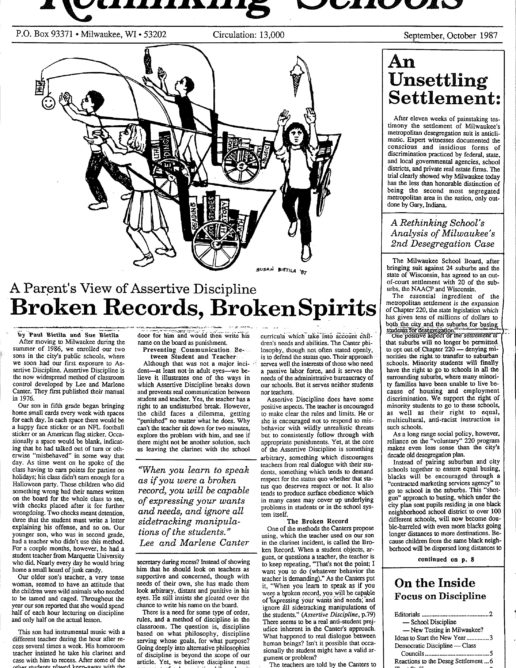School Discipline: Let’s Start Asking the Right Questions
In opinion polls parents often say that their greatest single concern about public schools is “lack of discipline.” So it is with pleasure that we are able to offer our readers, an important critique by two Milwaukee parents, Sue and Paul Bietila of an “assertive discipline” system currently in use in Milwaukee and other school districts. (See “Broken Records, Broken Spirits,” p. 1)
The Lee Canter Assertive Discipline system has been popularized through school inservices and staff development seminars. It often has been accepted uncritically as “the answer” to the serious discipline problems our schools face.
Some of Canter’s suggestions are common sense — that the administrators and teachers reach consensus on a discipline procedure, that parents be made aware of such policies, that rules be applied consistently, etc.
In essence, however, it is a glorified behavior modification program. While such a stimulus-response technique might have short term value as a transition to a more democratic form of discipline, as an ongoing system it is repressive and ultimately counter-productive.
Such a system by design fails to develop conscious, self-disciplined students. Most importantly, it does not address the underlying causes of student misbehavior.
What is needed is a frank appraisal of those school structures that leave students powerless, of curricula that are often boring and irrelevant, and of methods of instruction that rely excessively on the “lecture” or rote response. John Goodlad, in his massive study of US education found that such problems are widespread*. He stated in A Place Called School that “not even 1% of the instructional time” was devoted to discussion that “required some kind of open response involving reasoning or perhaps an opinion from students… the extraordinary degree of student passivity stands out”
Given the prevalence of these conditions in many schools, what is surprising is that students are as well behaved as they are!
The problems with structure, curricula and methods in our schools help create and are further compounded by the failure many students face in developing basic reading, writing and thinking abilities.
Not until these issues are addressed, will we begin to confront the real issue behind the discipline problems in our schools. We hope that teachers and administrators will read the parents’ critique and seriously consider the points raised. We encourage response from our readers.

